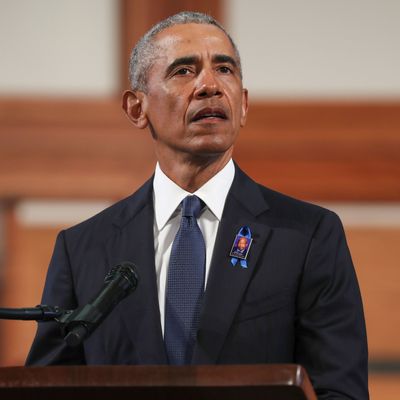
Thursday morning, the sitting president used his Twitter feed to issue one of his periodic, and to date most serious, threats against American democracy. Hours later, the previous president used a eulogy for John Lewis to deliver a forceful rebuttal.
Obama has a view of American history as a long fight, punctuated by setbacks and struggle, to bring reality into alignment with the country’s founding ideals. Five years ago, in a speech at the Edmund Pettus Bridge to commemorate the March on Selma, Obama unspooled the most complete version of this analysis. Crucially, Obama’s speech placed the struggle for black equality — the struggle for which Lewis is most famous — at the center of the American story. (This is of course the precise opposite of Trump’s view of politics as a struggle to restore lost greatness.)
In his eulogy, Obama developed that idea further. Someday, when the struggle for equality has been completed, he said, “John Lewis will be a Founding Father of that fuller, fairer, better America.”
Rather than confine himself to abstractions, Obama connected Lewis’s work to specific ongoing democratic conflict. The troops who beat peaceful civil-rights protesters in places like Selma live on in Trump’s attack on peaceful Black Lives Matter protesters at Lafayette Square. And the legacy of voting restrictions continues in the modern Republican campaign to make voting as burdensome as possible for minorities and young people by erecting bureaucratic hurdles, closing polling stations, and limiting voting by mail in a pandemic.
The most important element of Obama’s speech was his proposal for a new law to honor and continue Lewis’s legacy. The new John Lewis Voting Rights Act Obama laid out would not merely restore the guardrails of the Voting Rights Act that had been gutted by a Republican Supreme Court. It would include automatic voter registration, voting rights for ex-felons, more voting stations and early voting, making Election Day a national holiday, an end to partisan gerrymandering, statehood for Washington, D.C. and Puerto Rico.
Even if Democrats win the presidency and the Senate, though, none of these proposals could overcome a Republican filibuster. Obama’s most important suggestion was to eliminate the filibuster.
The filibuster is not only undemocratic but also the most important obstacle to progressive reform in the next Democratic administration. No Democratic administration will be able to do much with a 60-vote supermajority requirement. The filibuster used to be a rarely used tool of unusually strong dissent, generally reserved for blocking civil-rights laws (which is why Obama called it a “relic of Jim Crow.”) Old bull Democratic senators who have grown up in the institution have grown accustomed to it, even as it has been distorted into something that allows lifetime judicial appointments and tax cuts but blocks effective lawmaking. If it didn’t exist, nobody would think to invent it.
Obama is using his authority to tell Democrats to use their power, should they attain it, not only to save American democracy as it exists, but to extend it.






























